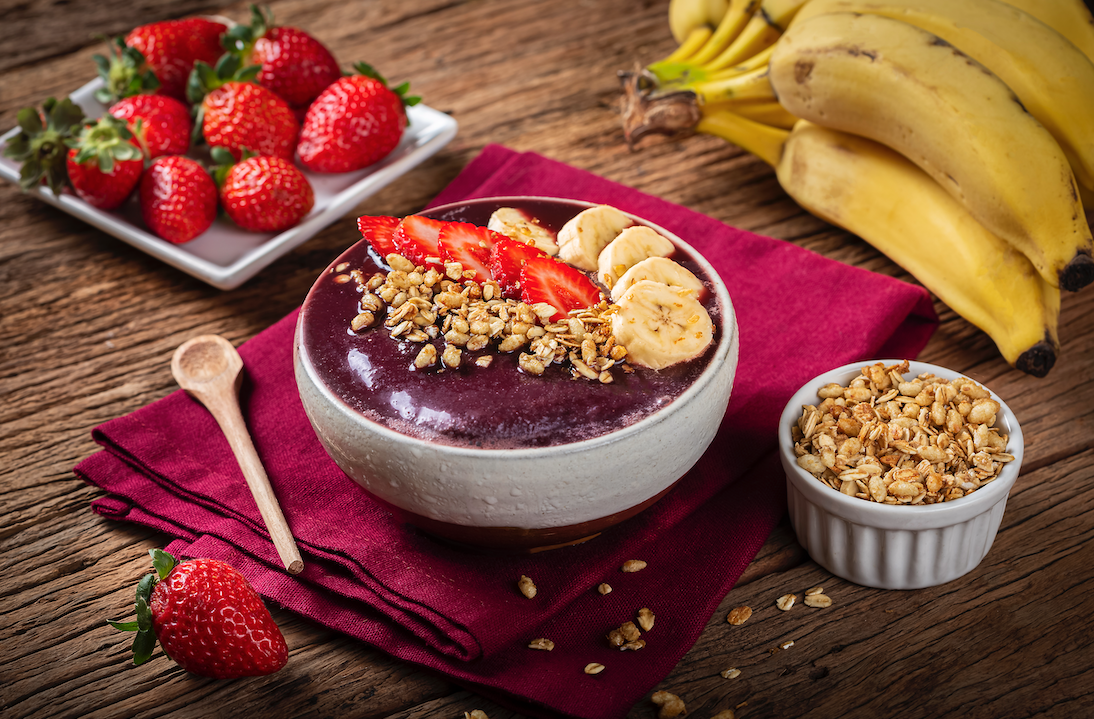
Acai
Acai is great as antioxidant and for weight loss. In recent years, the berry carries the title superfruit and purple gold. It’s native to the tropical forests of Central and South America.
Usage
Acai is loaded with benefits for your body, including your heart, brain, skin, and digestion. It can even slow aging, lower cholesterol, and inhibit cancer. You should eat a generous serving of acai daily. Acai is low in sugar.
Weight Loss
Acai helps speed up the digestion process, and can help with weight loss.
Anti-oxidant properties
Acai has high antioxidant content .
Prevents cancer cell proliferation
Due to the antiinflammatory, antiproliferative and proapoptotic properties.
Promotes brain function
Acai is great for brain health and can even helped improve memory.
Reduce cholesterol
Acai berries might be able to reduce cholesterol and blood sugar levels in overweight individuals over time.
Reduce Blood Pressure
Acai is able to drop blood pressure dramatically in a short period of time.

How to add Acai to your diet?
Because of their fast-rotting nature, the most frequently used form of acai berries is acai powder in supplements that promotes overall well-being. Another example of acai berry use is acai oil, a popular ingredient of different cosmetic products.
Make acai bowl or smoothy
Add frozen acai to your breakfast routine, and add other ingredients of your choice.
As a supplement
Acai is a popular supplement in a form of powder, tablet, or capsule.
Make a tea
Get your daily dose of antioxidants in your morning brew.
Açaí palm was a versatile resource for the human population who inhabited the Amazon region.
The berry was eaten either fresh or in the form of a juice or syrup, which was believed to promote immunity.
Except for the berries, the leaves were also used as a building material.
The roots were prepared into a tea that was used for the prevention of blood and liver diseases.
About
Açaí is the deep purple and juicy fruit of the Açaí palm tree. The tree is native to the tropical forests of Central and South America, where it represented a food staple for the locals before getting worldwide recognition in the 21st century. The irreplaceable ingredient of all picture-worthy smoothie bowls looks similar to red grapes, and the fruit gets darker with maturity.
Usually, there are two harvests per year, though the palm bears the fruit year-round. Unfortunately, acai gained a bad name due to an excessive marketing exploitation, which severely overstates its weight-loss properties.
In recent years, the berry carries the title superfruit and purple gold, which is probably a result of the attention that it received from many celebrities and influencers, while many professionals claimed it had cleansing, detoxifying, and antioxidant superpowers.
Composition
Nutritional value for powdered acai is usually found in food products and supplements: 534 calories, 52 g carbohydrates, 8 g protein, and 33 g total fat. The carbohydrate portion included 44 g of dietary fiber with low sugar levels, and the fat portion consisted of oleic acid (56% of total fats), palmitic acid (24%), and linoleic acid (13%).
The active constituents of acai are the polyphenols found in the pulp. Anthocyanins have antioxidant properties which protect cells against damage induced by stress, environment, physical activity, etc. Also, they enhance memory by inhibiting neuroinflammation and improving blood flow to the brain.
Fun Facts
Natives from the Amazon region placed spring leaves of the acai palm on the foreheads of their newborns. It was believed that the leaves will boost their immune responses.
Science
The National Center for Complementary and Integrative and Health (NCCIH) stated that acai berries might be able to reduce cholesterol and blood sugar levels in overweight individuals over time. More extensive in vivo studies are necessary for further elaboration.
Side effects
When consumed as a part of a balanced diet, acai berry does not show any major side effects.
The lack of in vivo studies, reliable sources, and inconclusive results about acai berries safety indicate that precaution is recommended, especially if previous berry allergies have been reported or the individual is pregnant or breastfeeding.
A very large amount of acai berries can affect the results of the MRI, so consumption right before the scan is unrecommended.
-
Sadowska-Krępa, E., Kłapcińska, B., Podgórski, T., Szade, B., Tyl, K., & Hadzik, A. (2015). Effects of supplementation with acai (Euterpe oleracea Mart.) berry-based juice blend on the blood antioxidant defence capacity and lipid profile in junior hurdlers. A pilot study. Biology of sport, 32(2), 161–168. https://doi.org/10.5604/20831862.1144419
Pacheco-Palencia, L. A., Mertens-Talcott, S., & Talcott, S. T. (2008). Chemical composition, antioxidant properties, and thermal stability of a phytochemical enriched oil from Acai (Euterpe oleracea Mart.). Journal of agricultural and food chemistry, 56(12), 4631-4636.



